8 in 10 Turkish adults see the U.S. negatively
This Pew Research Center analysis focuses on public opinion of domestic and international issues in Turkey. Views of the government leaders, institutions and other countries are examined in the context of long-term trend data.
The report draws on nationally representative surveys of 1,049 Turkish adults conducted from Jan. 29 to March 11, 2024. Surveys were conducted face-to-face and weighted to be representative of the Turkish adult population with the following variables: gender, age, education, region, urbanicity and probability of selection of respondent.
To compare educational groups across countries, we standardize education levels based on the UN’s International Standard Classification of Education (ISCED).
Prior to 2024, combined totals were based on rounded topline figures. For all reports beginning in 2024, totals are based on unrounded topline figures, so combined totals might be different than in previous years. Refer to the 2024 topline to see our new rounding procedures applied to past years’ data.
Here are the questions used for the report, along with responses, and the survey methodology.
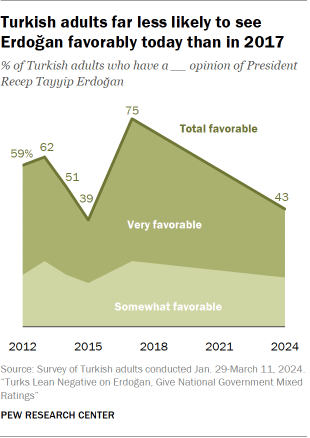
In May 2023, voters in Turkey elected Recep Tayyip Erdoğan to his third term as president. Less than a year later, Erdoğan’s Justice and Development party (AKP) suffered its worst-ever electoral defeat in local elections.
In the time between these two elections, Pew Research Center surveyed 1,049 Turkish adults. The results show negative opinions of Erdoğanand mixed views of the national government he leads.
Overall, 55% of Turkish adults have an unfavorable opinion of Erdoğan, while 43% have a favorable opinion. This marks a 32 percentage point decrease in favorability from 2017, including a 27-point drop in the share of Turks with a very favorable opinion of their president. The 2017 survey was conducted eight months after Erdoğan and his government survived a coup attempt by a faction of the military.
Support for Erdoğan is a key factor in Turkish public opinion on domestic and international topics alike. Compared with those who have an unfavorable opinion of the president, Turkish adults who see Erdoğan favorably are:
- More trusting in the national government to do the right thing for Turkey
- More confident that the May 2023 elections were conducted fairly and accurately
- More confident that the government will take the necessary measures to prepare for future natural disasters
- More satisfied with the way democracy currently works in Turkey
- More supportive of a form of government that relies on a strong leader
- More likely to see groups and institutions such as the military, religious leaders and the courts as having a good influence on the country
- More favorable toward China and Russia, and more confident in these countries’ leaders
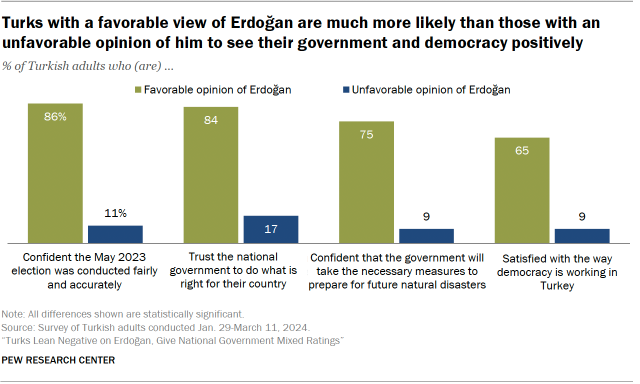
Age is another key indicator of public opinion on several topics. For example, adults ages 50 and older are more positive toward Erdoğan and the national government when compared with adults ages 18 to 34.
Frequency of prayer among the 98% of Turks who are Muslim is also tied to views of multiple issues. Muslim adults who pray more frequently (one of the Center’s measures of religiosity) have more confidence that the 2023 election was conducted fairly and accurately, for instance.
Below are some other key findings from the survey, which marks the first time since 2019 that Pew Research Center has polled in Turkey.
Confidence in the government
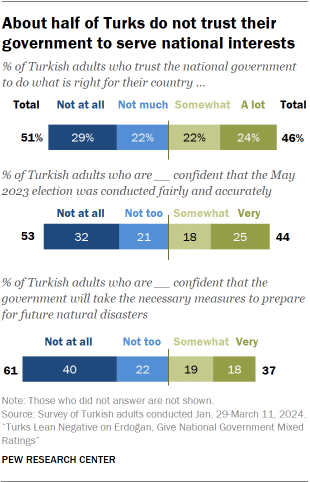
Overall, Turkish adults express limited confidence in their national government.
Roughly half (51%) say they do not trust the government to do what is right for the country. A similar share (53%) is not confident that the May 2023 presidential election was conducted fairly and accurately. And about a year after a 7.8 magnitude earthquake hit Turkey – leaving more than 50,000 dead – 61% of Turks are not confident that the government will take the necessary steps to prepare for future natural disasters.
Jump to Chapter 1 for more on how people in Turkey view their government.
Views of democracy
Two-thirds of Turks are dissatisfied with the way democracy is currently working in their country. But democracy itself – in both representative and direct form – is still a popular idea.
Majorities of Turks say representative and direct democracy would be good ways to govern Turkey (80% and 79%, respectively). And 59% say rule by experts, sometimes called technocracy, would be a good system of government.
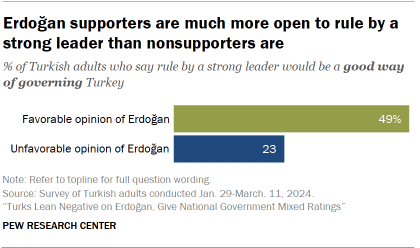
Much smaller shares say rule by a strong leader (34%) or by the military (14%) are good options. However, Turks with a positive view of Erdoğan are significantly more likely than nonsupporters to say each of these nondemocratic systems would be a good way to govern Turkey.
Jump to Chapter 2 for more on how people in Turkey view democracy.
Views of institutions and societal conflicts
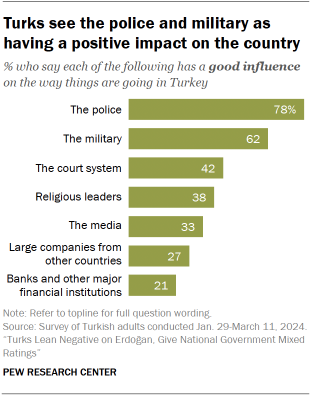
In Turkey, majorities say the police and the military have a positive impact on Turkish society (78% and 62%, respectively).
On the other hand, a third of adults or fewer say the media, large international companies, and banks and other financial institutions have a positive influence.
When it comes to tensions within their society, Turks see especially strong conflicts between people who support different political parties. Fewer Turks – though still a majority – say there are strong conflicts between people with different ethnic identities. Notably, in a country where a vast majority of people are Muslim, about half of adults (47%) say there are strong conflicts between Turks who practice different religions.
Jump to Chapter 3 for more on how people in Turkey view institutions and conflicts in their society.
Views of international affairs
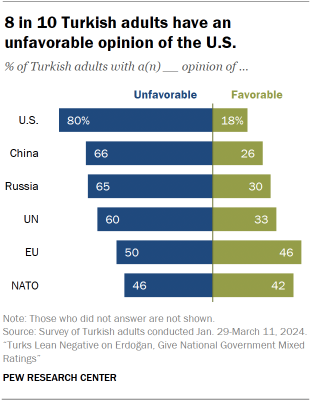
When it comes to foreign relations, Turks give mostly negative ratings to other countries and their leaders.
Majorities have unfavorable opinions of the United States, China and Russia, and most lack confidence in their respective presidents. Turks also report low trust in other international political leaders – including former U.S. President Donald Trump.
Turks have somewhat more positive opinions of NATO and the European Union. Since our last survey of Turkey in 2019, the share of adults with a positive view of NATO has doubled, though overall opinions of the alliance are still mixed. The share of Turks with a favorable view of the EU is up 12 points since 2019. And a majority of Turks (56%) favor their country becoming a member of the EU.
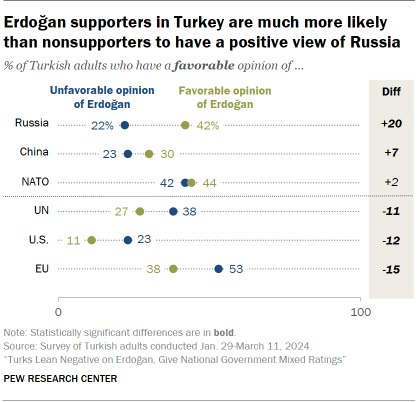
Views of several countries and international organizations are related to support for Erdoğan. For example, Turks with a favorable opinion of Erdoğan are more likely than those with an unfavorable opinion of him to see Russia and China positively. In turn, Turks with an unfavorable opinion of Erdoğan are more likely than those with a favorable opinion of him to see the EU, U.S. and United Nations positively.
Jump to Chapter 4 for more on how people in Turkey view international affairs.
